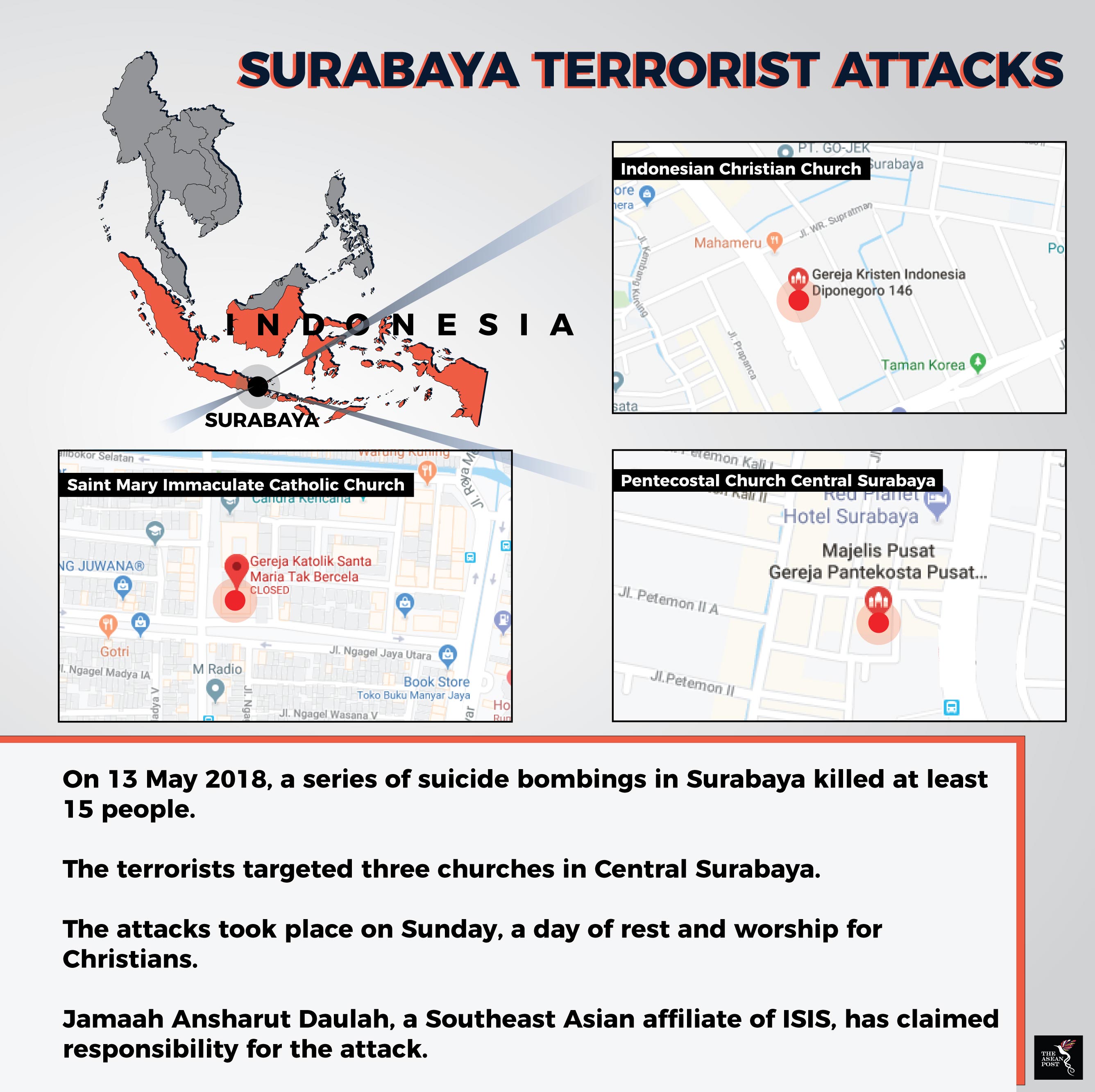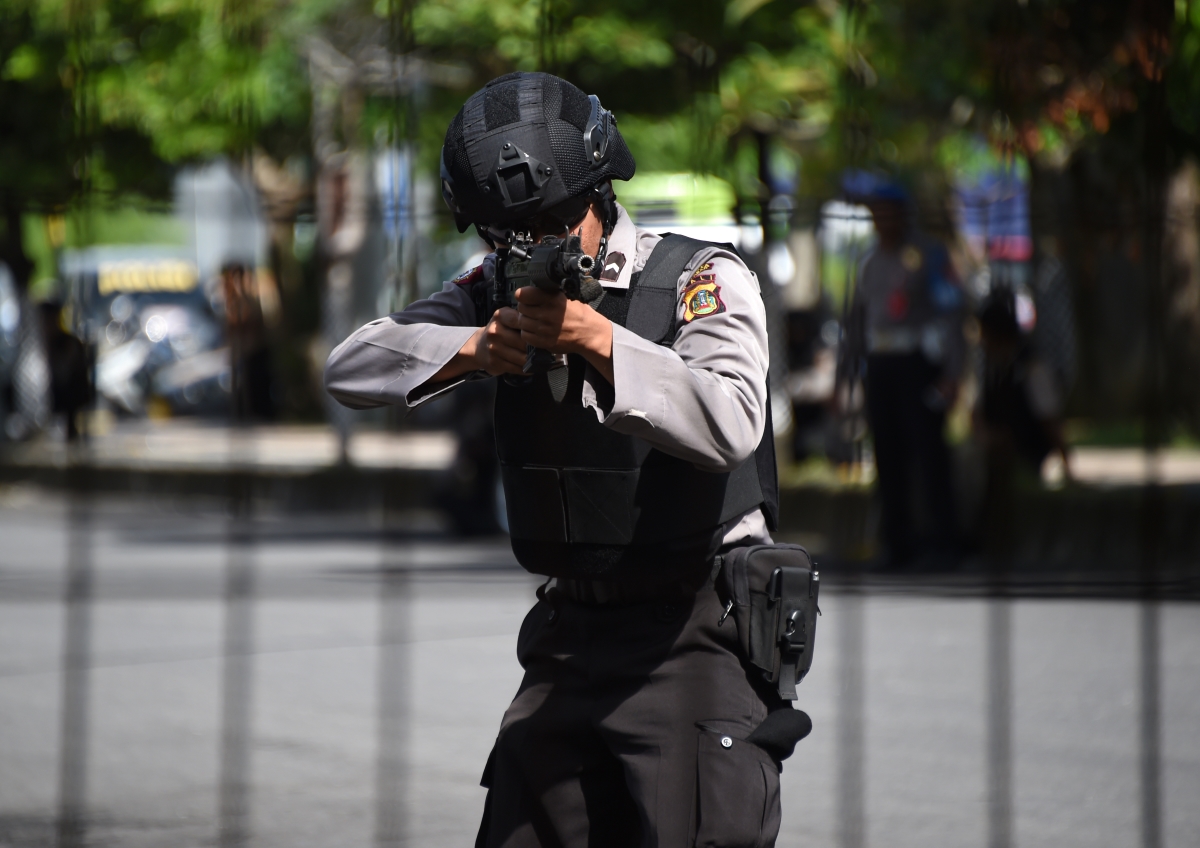Last week, Indonesia was swept with a wave of terror attacks. The most recent attack took place on 16 May, when four sword-wielding insurgents attacked officers at Riau police headquarters in Sumatra.
Prior to that, Surabaya – Indonesia’s second largest city – was targeted with a string of bombings. On 9 May, a family of suicide bombers attacked three churches in Central Surabaya, killing at least 15 people.
Less than a week later, on 14 May, another family of terrorists attacked police headquarters in the same city, resulting in the injury of at least four police officers and six local residents. This latest spate of terrorist attacks is the deadliest the country has seen since the 2005 Bali bombings, which killed 23 people.
Sadly, Indonesians are no strangers to such attacks. In the past decade alone, the country has seen at least 10 terrorist incidents. Having said that, the recent attacks were unlike any other terrorist attacks in the country’s history.
Source: BBC News
Families as insurgent units
To make matters worse, the Surabaya church bombings and police station attack were perpetrated by two families, along with their children.
In the case of the church bombings, the father of the family drove a bomb-laden car into Pentecostal Church Central Surabaya, while the mother and her two daughters, aged 9 and 12, blew themselves up at the Indonesian Christian Church. At the same time, the sons, aged 16 and 18, rode a motorcycle filled with explosives into the Saint Mary Immaculate Catholic Church.
The police station attacks were carried out by a family of five, who rode two motorbikes into a checkpoint near the station and detonated explosives there.
So far, Jamaah Ansharud Daulah (JAD) has claimed responsibility for the attacks. JAD was formed relatively recently in November 2015, and according to local media reports, forms the largest faction of Islamic State (IS) supporters in Indonesia.
The family that carried out the church attacks was described by the New York Times as “well-liked.” According to some terrorism experts, these families utilise their children as cover, so as to not arouse suspicions when carrying out their plans.
This disturbing new trend points to a larger danger brewing in Indonesia. The involvement of children reveals that the young are prone to terrorist indoctrination, hinting at a much larger failure in Indonesian society.
While Indonesia may be one of the most populous Muslim-majority nations in the world, the archipelago of 17,000 islands is also known for its diversity and religious plurality. However, the fact that two youths aged 16 and 18 could be indoctrinated into riding an explosive-laden motorcycle into a church shows that state institutions such as schools have largely failed younger Indonesians.
Education as a solution
By stressing the importance of tolerance and plurality in the academic system, their induction into an ideology in which other beliefs are seen as inferior may have been avoided, as well as the loss of life involved when children and families undertake to destroy the fabric of Indonesian society.
However, the schools are not the only ones at fault in this regard, with external forces perhaps exerting stronger influences in the country. Over the past few years, fundamental Islamist groups have seen rising popularity in the country.
The culmination of this was seen last year, when Jakarta governor Basuki Tjahaja Purnama was jailed for blasphemy after protests by hardline Islamist groups. Coupled with the rise of social media, the prominence of fundamental Islamic groups allows them to sway greater numbers with their rhetoric. While these groups may not be terrorist-affiliated, their takfiri ideology can easily be exploited by such groups.
The best way to combat radicalism is to address its root causes. Experts have called for the Indonesian education system to be reformed, with an emphasis on inclusion. One suggestion is to include multi-faith teaching in schools, so that children will be exposed to diverse religious perspectives.
Proper education also gives children and youths a foundation with which to view religious fundamentalism in an impartial light. This is the best way to deal with the growing threat of such groups, without banning them or infringing upon their right to free speech. If youths are educated properly, such destructive ideas, which can actively undermine Indonesia’s pluralism, would be less prevalent.
President Jokowi is currently arguing for tougher laws to fight terrorism. While that may help to a certain extent, it does not tackle the problem at its roots. He needs to be aware that for someone to carry out terrorist actions, they require justifications for such acts, and such justifications often come from misguided ideologies. As such, any move to address the terrorism issue must also address such ideologies.
